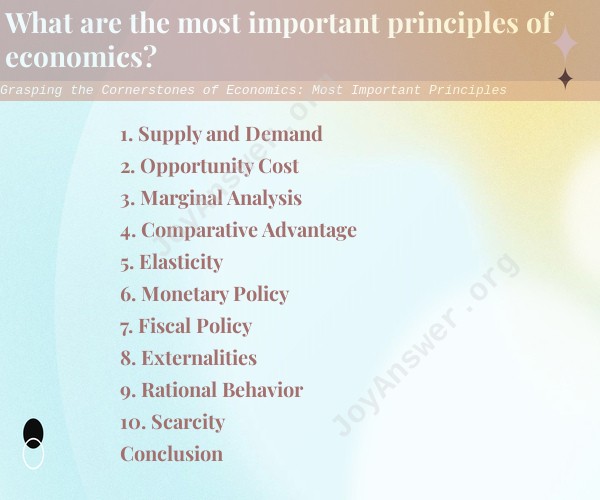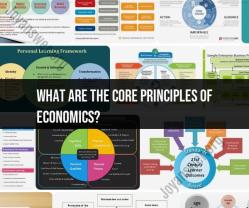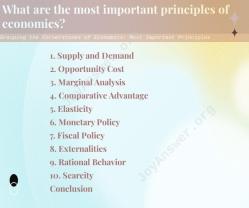What are the most important principles of economics?
Economics is a complex and multifaceted field that studies the allocation of resources, production, distribution, and consumption of goods and services. Understanding the fundamental principles of economics is essential for comprehending how economies function and make decisions. Let's explore some of the most important cornerstones of economics:
1. Supply and Demand
The law of supply and demand is a fundamental principle that shapes market economies. It states that the price of a product or service is determined by the balance between its supply and the demand from consumers. When demand exceeds supply, prices tend to rise, and vice versa.
2. Opportunity Cost
Opportunity cost refers to the value of the next best alternative that must be forgone when a decision is made. Every choice involves trade-offs, and understanding opportunity cost helps individuals and businesses make informed decisions about resource allocation.
3. Marginal Analysis
Marginal analysis involves examining the additional benefits and costs of producing or consuming one more unit of a good or service. Rational decision-making often involves comparing marginal benefits to marginal costs to determine whether an action is worth pursuing.
4. Comparative Advantage
Comparative advantage is the ability of an individual, firm, or country to produce a good or service at a lower opportunity cost than others. It forms the basis for international trade and specialization, enabling countries to focus on producing what they do best.
5. Elasticity
Elasticity measures the responsiveness of quantity demanded or supplied to changes in price, income, or other factors. Understanding elasticity helps predict how changes in variables will impact markets and consumers.
6. Monetary Policy
Monetary policy involves the control of a country's money supply by its central bank. Through tools like interest rates and open market operations, monetary policy aims to influence economic activity, inflation, and employment.
7. Fiscal Policy
Fiscal policy refers to government decisions regarding taxation and government spending. It is used to influence aggregate demand, economic growth, and stability by adjusting government revenue and expenditures.
8. Externalities
Externalities are unintended effects of economic activities on third parties who are not directly involved. Positive externalities (benefits) and negative externalities (costs) can lead to market inefficiencies and the need for government intervention.
9. Rational Behavior
The assumption of rational behavior underlies much of economic analysis. It suggests that individuals and firms make decisions that maximize their utility or profits based on available information and preferences.
10. Scarcity
Scarcity is the fundamental economic problem that arises from limited resources and unlimited wants. It drives the need for efficient resource allocation and trade-offs in decision-making.
Conclusion
These cornerstones of economics provide a foundational understanding of how economies function and interact. Whether it's supply and demand driving prices or opportunity cost guiding choices, these principles shape economic decisions at both individual and societal levels, ultimately influencing the allocation of resources and the well-being of communities.



